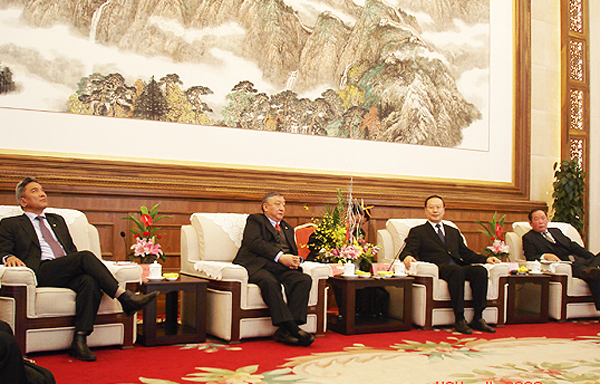
Prof. SD Muni, Distinguished Fellow, Institute for Defence Studies & Analysis, New Delhi, suggests that China be pressured in whatever peaceful way it is possible to adopt a truly multi-ethnic concept of nationhood as against its existing totalitarian ideology to ensure the country’s long term stability and that the question of the Tibetan nation be kept alive.
This article appeared in the Special Issue 2018 edition of the Tibetan Review, published in association with the JNU Tibet Forum. Excerpt from the 2nd annual symposium in memory of Prof. Dawa Norbu organized on April 7, 2016.
Thank you chair and thank you to the organizers for calling me here. I am no expert on either Tibet or China; you have better people around; where has Srikanth gone? I agreed to do this because I loved Dawa Norbu and I thought this is an occasion for me to pay my tribute to him and that’s probably the only reason why I am in your midst. Dawa Norbu was a wonderful human being; I have known him, and we have worked together for a very, very long time. Warm, sensitive and compassionate as an individual, he was an extremely dependable colleague. In any problems of the center or the school or the university, I always found it a pleasure to sit with Dawa and discuss some of its nuances and finer aspects. He would come with quite unconventional and very persuasive answers to some of the problems we faced.
He was also a great teacher. His students I happened to run into always praised him very highly. He was very sensitive to the demands and needs of his students. Not a very harsh, very strong teacher, he would listen to them and respond to them.
Lastly, he was an accomplished scholar with international recognition. He wrote on Tibet. He wrote with passion. He wrote less from his mind and more from his heart and that’s where he brought some fascinating aspects of the puzzle which stands before us as Tibet and helped us understand that puzzle.
His very first book – maybe he wrote earlier too, but I read that as his first book – “Red Star over Tibet” actually provides a window on not only Tibetan life but also on what the Chinese did to Tibet from 1951 till 1959 and onwards. He takes us on that journey in very involved and engaged manner without – and this is the beauty of Dawa – giving any concession either to the feudal traits or superstitions in the name of tradition and justifying it. He quite clearly, critically assesses them and says this is not the era or this not the issue to be either highlighted or to stick to in Tibet’s struggle.
He grapples with the idea of Tibet and nationalism and (on which today) we have had the debate and I think better experts have talked about it. He swung between two positions on Tibetan nationalism which must find its place between independence and autonomy. In some of his articles and books, including later on in his writings on China’s Tibet policy, he again and again tried to resolve this dilemma. I don’t know if he could resolve it because he eventually came to a concept of what you call a people-based nationalism, not necessarily tradition rooted nationalism or nationalism in the nation-state sense. I have my problem when you say nation-state; I will some to it in a short while.
He talked about the self-determination of a people – self-determination not in terms of separation because you know Dawa was writing as an individual and we are all individuals; we are products to a very large extend of the times in which we are living. So when Dawa was writing he was writing as a very cautious, restrained human being with his heart in the situation as it evolved and his vision in terms of what the future would be and this is where he tried to tackle the Chinese approach or the Chinese policies towards Tibet.
There is something very clearly coming out of the Chinese policy; you have probably debated it and discussed it. I don’t have enough time to go into it, but the Chinese have realized that the use of force has failed to suppress or quieten the Tibetan urge or the Tibetan identity or the Tibetan nationhood, if you want to say that. Then they took recourse to huge infusion of investments, the infusion of industrialization, and the infusion of infrastructure by giving lots of economic sops to the Tibetan people, probably to take them away from their identity or at least to tell the world that this was what they were doing in Tibet and that there was no point in drumming the Tibetan cause now.
But they failed utterly. Before 2008, there was smug complacency in Beijing with the sense that the Tibetan issue had been solved by the infusion of infrastructure and investments and by industrialization. There were new roads and discotheques in Lhasa and therefore everything was absolutely fine and settled.
However, suddenly, in 2008, they were led to realize that this was not so. The Chinese were shaken from their complacency by the realization that the Tibetan issue still remained a very vital question for them to address.
Now the Chinese are trying something else probably and this is something new in a communist state, if at all they still want to call themselves a communist state. They want to appropriate religion and culture to blunt and diffuse the question of Tibetan identity.
Economic investments did not work because they concentrated on urban areas whereas Tibetans live in rural Tibet, largely as farmers and nomads. There are statistics which show that in urban areas, particularly in Lhasa and such other cities and towns, there are more Han people, more outsiders who have migrated from other parts of China than Tibetans. Indeed, a recent UNDP report says that Tibet still lags behind the other areas of China in terms of human development, harshness of conditions, scarcity of resources and insufficiency of infrastructure, and due to limited potential sources of economic growth.
The growth that takes place is concentrated in cities and yields little benefits to many ethnic Tibetans most of whom live in rural areas and lack skills compared to the migrant Chinese workers. Even when coming back to the civilizational and the cultural aspects, the Chinese migrants have set up hotels in the rural areas for the tourists to go there and stay. And if you look into the hotels, 85 to 90 percent of the people employed are not Tibetans. The fact is that the Chinese have utterly failed to provide skill, education, modern awakening, and modern capabilities to the Tibetan people. This is very clear and many critics have said the whole thrust of China’s developmental approach in Tibet is largely structural rather than human. Development of human resource has not been taken into account while planning the development areas and development capacities.
Dawa felt that the solution to the issue of Tibet was for China to revert to the traditional mode of exercising indirect control over the territory because this would mean giving local autonomy to the Tibetans, with Tibet posing no challenge to the central authority in Beijing. He therefore insisted that talks should be held and the issue resolved somehow on this basis.
As I told you, I have no great understanding of what the Chinese are doing in Tibet. But it appears to my mind that Chinese nationalism is also redefining it in keeping with the concept of the Middle Kingdom. When the Middle Kingdom was very powerful as the center of authority, it dealt with the peripheral regions in a softer and in an indirect manner. This ensured that the peripheries were happy, lived under China’s sovereignty, and could be controlled on that basis.
This concept has, however, undergone a change. And it is the modern concept of nation-state, as distinct from nations within a state, which has given rise to the problem. In fact, in Asia we are living in a situation where there are several nations within one state and the moment you try to transform that state into a nation-state, as many other countries are doing, problems arise. Sri Lanka is trying to do that; so is Pakistan. And there are now very strong groups in India that are trying to say “one nation, one state”; that you cannot have different nationalities in one state and this is the root cause of the problem. This amounts to trying to impose an artificial situation by trying to make a nation-state of a multi-nation state.
Therefore I feel that within even Dawa’s concepts of nationalism, even in the old concept of nationalism, it is possible to resolve this issue and this is where I say I have my fifteen minutes almost running out. I wanted to go into India’s Tibet policy or international response to Tibet.
We all understand that you cannot face up to the Chinese physical power, strength, and might. But keep the question of the Tibetan nation alive. Try and seek a solution of the Tibetan nation within a multination state. Now if they could have a concept of ‘one country, two systems” (or ‘two nations, one state’), which is what they have with Hong Kong, why can’t they have three or four or whatever number of states is the requirement for ensuring stability and order within a multination state.
This has been the traditional response of India. We have not responded to any “one nation, one state” demand because doing so would have led to India disintegrating internally. Most of India’s neighbours would also have disintegrated internally. In Sri Lanka we did not want it; in Nepal we do not want it today. And I think in Tibet this is what should be done. This is where the whole question of negotiating a deal with Tibet on the part of Beijing is very, very necessary.
I know Beijing is still complacent in this respect. And as I told you, its latest posture is really to invoke religion and civilization in order to camouflage or divert attention from the Tibetan issue, from the popularity of the Dalai Lama, or the institution of the Dalai Lama. They have all the plans to change the institutional character of the Dalai Lama once His Holiness is physically not there and somebody else comes in. So they may have different kind of plans.
But the obligations in terms of humanitarian interest of the global community, particularly that of a country like India, should be wedded to the idea of multination state. That is what we must try to persuade and pressurize and probably force – without the use of military force – the Chinese to come to terms with. We should convince China that it cannot have a nation-state because the nation-state idea is inherently quite destructive and disintegrating in societies which have multi-nation, multi-ethnic societies. So this is where I think I find Dawa still being relevant in many ways. I have lots of quotations from Dawa’s books to underline some of this point, but time constraint is something that we should all honor, thank you very much.
* Transcribed and edited text






